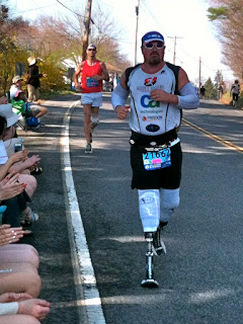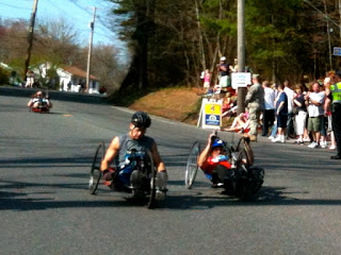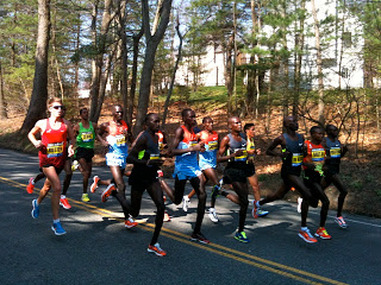 A double amputee runner A double amputee runner The Boston Marathon is the Holy Grail of runners. Anyone can sign up to run a 26.2-mile race in Indianapolis or Beaver Island, Michigan, but you have to qualify for Boston. My son-in-law told me, “The easiest way to qualify is to get old.” That’s because the qualifying time goes up with age. Dan didn’t wait to get old. He did the distance in less than three hours at Beaver Island earlier this year and promptly went on to do two more Marathons culminating in a personal record of two hours and fifty-four minutes in New York in November. The original Marathon runner who brought the news of victory in the battle of Marathon to Athens in 490 B.C. supposedly dropped dead when he had delivered his message. Dan didn’t drop dead. He shed tears of joy; he had achieved his goal—qualifying for Boston. But a lot can happen between qualifying and the race. The risk of injury goes up with intensive training, and a month before the race Dan suspected a stress fracture in his right shin. Pain interfered with training, and he considered calling the whole thing off. But even doing part of Boston would be better than none; trying is better than not starting at all. He was feeling hopeful last Monday when he caught the assigned shuttle at 6 AM for the ten o’clock start of the race, although he was aware that he hadn’t run any long distances in a month.  Those are SOME wheelchairs! Those are SOME wheelchairs! We took his wife and my sister (also distance runners) to mile three to cheer him on. It was a lovely wooded neighborhood on the outskirts of Boston. Many races are circuits where the start and finish are not far apart, and supporters can cut across the middle to cheer in several locations. Boston is a straight line into the city. 27,000 people signed up for this year’s race. Predicted temperatures were in the 90s. Race medical staff sent cell phone advisories not to run. (No doubt covering their bases so no one could sue when they got sun-stroke.) They even offered to carry over your registration to next year if you chose to defer. (No money back, however.) Dan is in the army and scheduled to be in Afghanistan this time next year, or he might have taken them up on that offer. Long before Dan’s coral started, official cars came past mile three. The first racers were the para-racers—amputees with special athletic prosthetics, high-tech racing wheelchairs whose drivers wore helmets, teams pushing the severely handicapped. Next came the elite women. They start half an hour before the elite men. That way they finish before the first man, which allows their time to be an official women’s time, un-pushed by a man’s pace. Most of the front-runners were African. Kenyan and Ethiopian Olympic teams have not yet been chosen, so the runners are still proving their worth.  You'll see some of these in the Olympics. You'll see some of these in the Olympics. Then came the elite men. My daughter gleefully pointed out famous runners whose names I only dimly recognized. They flashed past so quickly it was hard to focus on faces. The elite men all had bib numbers below a thousand. Eventually we spotted numbers over a thousand in the mix and began to seriously watch for Dan. “There he is!” Erika waved excitedly. Her husband knew what mile to look for us and which side of the street we would be on. “Seven thirty.” He called as he passed. “Feeling great.” He glowed with sweat and adrenaline practically oozed out of him. He disappeared in the crowd of other runners. Seven and a half minutes per mile was slower than his usual pace, but Dan was aware of needing to pace himself. As we hoofed it to where we had left our car (pointed away from the course for a quick get-away), we did the arithmetic, calculating how long it would take him to reach the ten-mile mark—our next agreed meeting place. We should have almost an hour. But the main road into town was the race route. Erika punched locations into her cell phone and plotted a route along narrow, wooded back roads to the next location. We made it with time to spare. The official timing truck just ahead of the elite men was passing as we arrived. We stood with other fans, shouting encouragement as the runners passed, many drooping in the unseasonable heat. Erika got an official message with Dan’s pace when his tracking chip passed the five-kilometer (6.2 miles) mark. More than nine minutes. He had slowed down. “He was planning to run/walk if necessary,” she reminded herself. “He really wants to finish even if it takes him the whole seven hours allowed.” We started getting nervous when the first responders rolled an ambulance gurney past us. It would not be the only one needed in these ninety-plus temperatures. Then Erika’s phone rang. Caller ID was an unknown number. “Hello?” she said carefully. Dan could hardly walk when we picked him up at mile seven. He was sitting in the back of the ambulance with an ice pack strapped to that pesky shin. With his deployment to Afghanistan, he won’t be running Boston next year, but he will be back. He assured us of that. I thought of all those runners with one leg or none, the ones who were pushed by teams of friends, the blind runners linked with a rope to a guide, the ones who were vying for Olympic spots and the ones who would take seven hours to complete the course or be taken by wheelchair to the medical tent. There is something about hope and the discipline of training; about commitment that fights through the pain and expends every ounce of physical effort even when hope must be deferred to another race, another year; something that inspires those of us who stand on the sidewalk ringing cowbells and shouting ourselves hoarse to examine our own commitments. How hard am I willing to work? How much am I willing to suffer? Can I face defeat and get up and try again? I didn’t hear anyone out there complaining that it was too hard, only promises to be back. Thank you, Dan, for inspiring me to renew my own commitments, to “press onward toward the prize.” It was an honor to witness your dream. We believe in you.
1 Comment
LeAnne
1/8/2015 01:07:27 am
This post was moved from another site. All comments were lost.
Reply
Leave a Reply. |
AuthorLeAnne Hardy has lived in six countries on four continents. Her books come out of her cross-cultural experiences and her passion to use story to convey spiritual truths in a form that will permeate lives. Add http://www.leannehardy.net/1/feed to your RSS feed.
To receive an e-mail when I post a new blog, please subscribe.
Categories
All
Archives
November 2022
|
 RSS Feed
RSS Feed